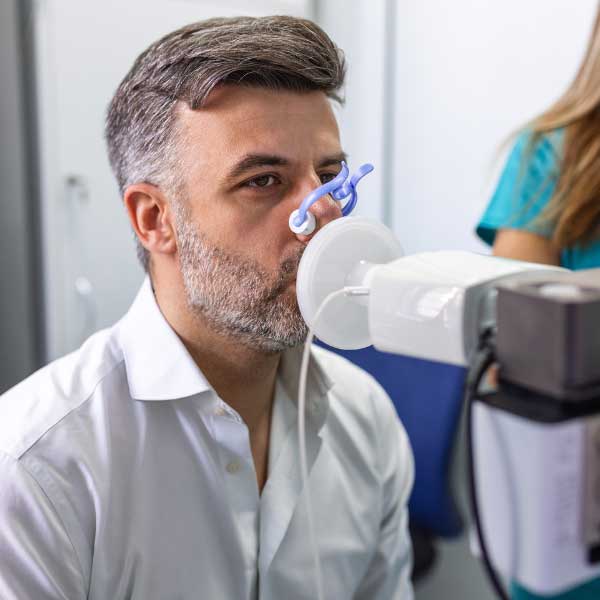
An important function of the lungs is to transfer gases. They allow oxygen to pass into the bloodstream, and carbon dioxide to pass from the blood to your lungs.
If these gases don’t pass normally, it could indicate lung disease such as emphysema, asthma, interstitial lung disease (or scarring of the lungs) and pulmonary embolism (or a blood clot in the lungs).
What is Single-Breath Carbon Monoxide Uptake in the Lung?
This test, also known as lung diffusion capacity, checks to see how well your lungs are getting oxygen to your bloodstream and removing carbon dioxide.
During this test, you’ll be connected via mouthpiece and tube to a machine. You'll breathe in a harmless tracer gas and hold your breath for about ten seconds, then exhale. The amount of tracer gas you breathe out will then be measured.
How to Prepare for Your Test
On the day of your test, it’s important to:
Stop smoking or other exposure to carbon monoxide (a colorless, odorless gas produced by burning gas, wood, charcoal, propane or other fuel)
Avoid heavy exercise immediately before the test
Stop drinking alcohol at least four hours before the test
Wear loose clothing to allow for chest expansion (no tight belt or vest)
Avoid having a large meal two hours prior to your test
Your appointment may be rescheduled if you haven’t prepared according to these criteria.
Call us ahead of time if you:
Have an inability to follow instructions*
Have had a heart attack in the last month
Have chest or abdominal pain
Have excessive pain while using a mouthpiece
Have stress incontinence, or an unintentional loss of urine during movement or physical activity
Have had recent eye surgery (1 week to 6 months depending on surgery)
Have had recent brain surgery or an injury (3 to 6 weeks)
Have had a collapsed lung (2 weeks)
Are spitting up blood
*If a patient is unable to follow instructions due to a confused state, young age or dementia, then a parent, caregiver or guardian may call on their behalf.
Need More Information?

The American Thoracic Society provides information on pulmonary function tests:
If you have any questions about your test, please call us:
Adult Testing
Pediatric Testing
For your health information, including access to medical records, lab results and bill pay, download our MyHealthMate app today.
We use cookies and other tools to optimize and enhance your experience on our website. View our Privacy Policy.

